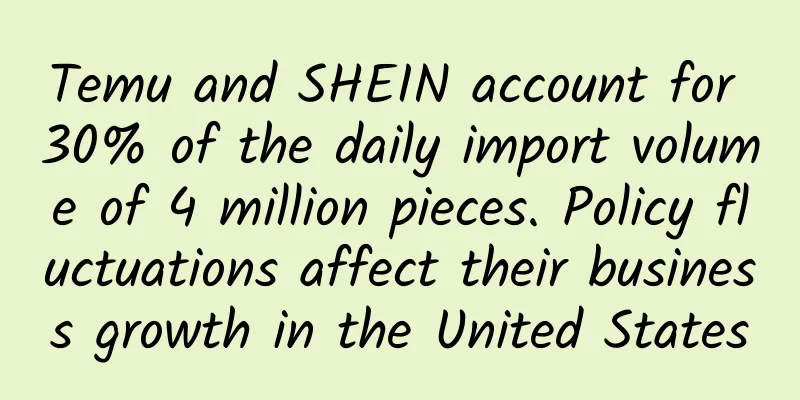Temu and SHEIN account for 30% of the daily import volume of 4 million pieces. Policy fluctuations affect their business growth in the United States

|
Just three days after canceling the small duty-free policy for Chinese goods, the United States suspended this provision. On February 7, US President Trump signed an executive order announcing the suspension of the cancellation of the "minimum" duty-free policy until the Ministry of Commerce has established a "complete and efficient system" to fully handle and collect relevant tariffs. Under this new change, Temu and SHEIN have won a breathing space. But obviously, Temu and SHEIN still cannot relax. They must now face up to the potential uncertainties brought about by policy adjustments, prepare for the future, and find a new and certain growth path under the new situation of cross-border e-commerce. To them, this is, to some extent, a necessary process of stepping out of their comfort zone. In the past few years, the US market has played an important role in the story of Temu and SHEIN's accelerated growth. According to Huachuang Securities' forecast, the US market will account for 35% and 32% of Temu's global GMV in 2024-2025 respectively; as for SHEIN, as early as 2022, the European and American markets have contributed 60% of its revenue. Photo/Huachuang Securities But now, policy fluctuations, Amazon's obstruction, etc., have cast a question mark on Tmeu and SHEIN's growth prospects in the United States. 01 Small-item duty-free: a growth tool, but also a new bottleneck On February 1, Trump signed an executive order announcing a 10% tariff on goods imported from China. On February 3, the U.S. Customs and Border Protection (CBP) issued an announcement that imports from China would no longer be subject to the "minimum" duty-free policy and would be subject to an additional 10% tariff, which would take effect on February 4 along with the new tariffs. In the few days after the release of this news, feelings of anxiety and even panic were quickly transmitted to various roles and players in the cross-border e-commerce industry chain. The United States' T86 "small duty-free" clause began in 1938. In the 2016 revision, the U.S. Congress raised the duty-free threshold for personal imported goods from US$200 in 1994 to US$800. For a long time, this policy adjustment has been beneficial to many cross-border sellers - many cross-border sellers do not have to pay tariff costs or bear warehousing costs, and can thus maintain a certain low-price advantage. To a certain extent, this is one of the reasons why Temu and SHEIN have grown rapidly in the US market in the past few years: CBP data shows that in fiscal year 2024, the number of goods imported into the United States through small exemption rules exceeded 1.36 billion, a significant increase from 1 billion in 2023, with more than half of these packages coming from China. The New York Times also reported that the number of duty-free packages has increased tenfold since 2016; Of the nearly 4 million small packages imported into the United States every day, more than 30% arrive via Temu and SHEIN; More cross-border merchants are small and medium-sized sellers. Tianfeng Securities pointed out in a research report that in 2022, 42.9% of cross-border e-commerce sellers will have revenues below 50 million yuan. The "full trusteeship model" that has been rapidly rolled out in the industry since 2023 is actually more beneficial to small and medium-sized sellers, helping the platform to further enrich supply and maintain its low-price advantage. Under the new U.S. CBP regulations, Chinese goods exported to the U.S. are not allowed to clear customs in a "minimum" manner and enjoy tax exemption. Instead, they need to submit formal or other informal declarations and pay all applicable tariffs, taxes and related fees. After T86's customs clearance model failed, the first to be impacted were small and medium-sized businesses in the cross-border e-commerce market, such as self-shipping sellers on Amazon and eBay, sellers who adopted the full-hosting model on the Temu and SHEIN platforms, and independent website sellers. An Amazon self-shipping seller previously told the media that this policy "is an industry earthquake for us small sellers." He mentioned that they have long relied on the small exemption policy, have no overseas warehouses to stock up, and mainly use small packages for direct mail. The seller said that the increase in tariffs and customs clearance fees has led to a significant increase in costs and eroded profits. Lucas Zheng, founder and chairman of Bao Guo Shipping, a US logistics and customs clearance solutions provider, also told Caixin.com that the T86 method cannot be used for customs clearance and tax exemption. Not only will tariffs increase, but also customs clearance fees and other costs will increase. More importantly, the customs clearance efficiency will be greatly reduced. "The cross-border parcel model is completely unsuitable for cross-border e-commerce," he said. The collective price increases by logistics companies that provide freight forwarding services illustrate this point. A few days ago, Yuntu Logistics, Yanwen Logistics, Orange Union China, 4PX Express, SF Express International, etc. all raised their prices. Take Yuntu Logistics as an example. On February 4, it announced that it would add a customs clearance fee of 20 yuan per ticket from February 5, and would collect a 30% tariff deposit in advance when the package is signed in. The final amount would be based on the actual amount collected by CBP, and the settlement principle of "more refund and less supplement" would be implemented. On February 8, Yuntu Logistics issued another announcement to cancel these two fees. Now, Trump’s announcement to suspend the implementation of the “minimum” tax exemption policy has undoubtedly relieved many small and medium-sized cross-border sellers. However, in the long run, the uncertainty and instability of the “frequently changing” policies will obviously not be able to completely dispel the sense of uneasiness in the cross-border e-commerce industry. For Temu and SHEIN, how to find a breakthrough amid new uncertainties has also become a new challenge. 02Semi -hosting, Temu and SHEIN’s early attempts As Temu and SHEIN rapidly expand in the U.S. market, low prices are one of their core advantages. Their low-price advantage is based on three premises: The low-cost bonus of China's huge industrial supply chain, the policy bonus of early tax exemption for small items, and the market bonus of insufficient supply of low-priced products from US e-commerce. This allows them to more efficiently connect China's low-cost supply with the surging demand for low-priced products in the U.S. market. Among them, in the past few years, one of the important measures taken by Temu and SHEIN in establishing economies of scale is to lower the threshold for small and medium-sized sellers to engage in cross-border e-commerce, and the full-hosting model is the core measure. Under the fully-hosted model, everyone from the platform to cross-border merchants can maximize the benefits of the small item tax exemption policy. Under this model, cross-border e-commerce platforms such as SHEIN and Temu first adopted the "cross-border direct delivery" model, that is, direct delivery of small tax-free packages. Amazon's merchants using the self-delivery model and its low-cost store Haul, which was launched last year and is a fully managed model, are also direct mail models. However, the full-hosting model also has limitations, such as limited product categories, being more friendly to small and medium-sized items, limited localized fulfillment service capabilities, and the inability to reduce air freight costs, etc. In addition, since 2023, the regulatory risks faced by the fully managed small package air transport model have gradually increased. In the first half of 2023, the U.S.-China Economic and Security Review Commission and the House of Representatives' Select Committee on U.S.-China Strategic Competition successively issued reports accusing Temu and SHEIN of taking advantage of minimum clauses to export goods to the United States and avoid tariffs and customs inspections; On April 5 last year, the U.S. Department of Homeland Security announced that it would strengthen the review of minimum exemption packages, including expanding the scope of inspection targets, strengthening inspections and testing, and increasing information sharing. Against the above background, since last year, the semi-hosting model has become the focus of cross-border e-commerce platforms. Temu launched this model in March last year, and SHEIN followed suit in May. Photo/Huachuang Securities Under this model, logistics delivery methods are more dependent on "overseas warehouses". Cross-border e-commerce sellers deliver goods to overseas warehouses in advance through cross-border logistics. After the order is placed, the goods are shipped from the overseas warehouses to consumers. To a certain extent, the platform’s introduction of a semi-custodial model is also a proactive response to regulatory risks. However, at present, compared with e-commerce platforms such as Amazon, Temu and SHEIN do not have an advantage in overseas warehouse layout, and in terms of results, the semi-custodial business is not progressing smoothly. Take Temu as an example. After the semi-custodial model was launched in March last year, Pinduoduo had high hopes for it, but a year later, the progress of Temu's semi-custodial business has not been as good as expected. According to a report by LatePost, a Temu source said that the internal expectation for the semi-custodial business is "only success and no failure. It must be done and it will definitely be done." To this end, Temu has sent a number of first- and second-level supervisors to lead the team and formed a nearly 1,000-person investment promotion team, hoping to double the supply of goods and drive the semi-custodial business to contribute one-third of Temu's GMV in 2024. However, the progress of Temu's semi-hosted business was not so smooth. As of October last year, the number of merchants and products recruited by Temu semi-hosted in the two major markets of Europe and the United States had failed to reach the original target. Citi analysts also predicted in a report that Temu's local warehouse plan will only account for a small part of its overall business. By the end of 2024, the total commodity transaction volume of local warehouses will only contribute about 20% to its transaction volume in the US market. 03Temu and SHEIN have little comfort zone left Since 2024, an obvious signal is that both Temu and SHEIN have shown signs of slowing down. According to Dolphin Investment Research's estimates, Temu's revenue in the second quarter of 2024 will grow by about 10% month-on-month, and the month-on-month growth rate in the third quarter may not exceed 10%. Combined with the previous estimates of Huatai Securities in a research report, Temu's month-on-month revenue growth rates were 47.11% and 18.42% in the fourth quarter of 2023 and the first quarter of last year, respectively. Photo/Huatai Securities SHEIN's rapid growth also began to encounter challenges after 2022. According to the Financial Times, although SHEIN's revenue remained in a high growth range of 52.8% in 2022, its profit performance fell for the first time, from US$1.1 billion in 2021 to US$700 million, and its net profit margin fell from 7.5% in 2021 to 3.2%. This net profit margin performance is not good. Guosheng Securities said in a report in November 2021 that SHEIN's net profit margin is 5%-10%, while the net profit margins of apparel industry giants are generally above 10%. For example, ZARA's parent company Inditex's net profit margin in fiscal 2021 was 11.7%. By 2023, SHEIN had rebounded. The Financial Times previously quoted people familiar with the matter as saying that SHEIN's GMV in 2023 was about US$45 billion and its net profit exceeded US$2 billion. But it is obvious that SHEIN is currently unable to maintain a stable revenue and profit growth rate. At the end of last year, The Information reported that SHEIN's revenue growth slowed from 40% last year to 23% in the first half of this year. In the first half of this year, its profit also fell by more than 70% to slightly less than US$400 million. Objectively speaking, a slowdown in their growth rate is almost inevitable. For example, from the perspective of market competition, in their current core markets of the United States and Europe, competition from local e-commerce platforms is becoming increasingly fierce. At the end of last year, Amazon officially launched the low-price store "Amazon Haul", which was opened to some customers in the United States on November 13. This was a plan mentioned by Amazon in June last year. According to a report by Ebrun, "Amazon Haul" is similar to a fully managed model and adopts an invitation-based investment promotion method. Orders are fulfilled and delivered by warehouses operated by Amazon in China, and sellers are only responsible for sending goods to Amazon's domestic warehouses. In addition, "Amazon Haul" mainly provides white-label low-priced fashion, home and daily necessities products. The first batch of open products covers 9 categories including clothing, home, beauty, electronics, accessories, office supplies, kitchen supplies, sporting goods, gardening supplies, etc. The launch of "Amazon Haul" is Amazon's counterattack against Temu and SHEIN. The Wall Street Journal previously reported that people familiar with the matter said that Amazon has regarded SHEIN and Temu as a greater threat than retailers such as Walmart and Target. When it comes to the European market, the competitive situation faced by Temu is becoming increasingly complex. The European e-commerce market report released by ChannelX shows that Amazon and eBay account for about 17% and 14% of European traffic respectively, followed by e-commerce platforms such as AliExpress, Allegro and Etsy, whose traffic shares are all in the single digits. Of course, earlier, Temu and SHEIN were also listed in the ranking of the top ten cross-border e-commerce platforms in Europe released by CBCommerce.eu - Temu ranked fifth and SHEIN ranked eighth. Coupled with the high uncertainty brought about by policies, Temu and SHEIN need to find new ways to break through under the new normal of cross-border e-commerce. Semi-trust is, to some extent, one of the solutions. CITIC Securities pointed out in a research report that the new tariff environment in the United States mainly affects cross-border e-commerce from three dimensions: direct tariff costs, customs operating costs, and disturbances in fulfillment time, but has little impact on the overseas warehouse stocking model. Some brokerage research reports also pointed out that policy changes in the US market will help the platform further promote semi-custodial business. In fact, Temu and SHEIN have already done this recently. An insider in the e-commerce logistics industry told the Global Times that Temu recently launched a new feature, "one-click product transfer", which supports one-click publishing of products under the same entity's fully-managed stores to semi-managed stores; there are also media reports that SHEIN officials recently released a semi-managed entry policy for the US site in the community, and began to introduce semi-managed merchants on a large scale, and provide these merchants with tens of billions of on-site and off-site traffic support. But as they push for semi-hosted business, a direct challenge is how merchants choose. In the past, merchants who engaged in full-hostage business were largely attracted by the low threshold of cross-border operations. Now, asking them to switch to a semi-hostage model can objectively avoid the uncertainty brought about by policy risks, but new risks have emerged. For example, there are risks such as high costs and unsalable goods in overseas warehouses. To a certain extent, this may also be one of the reasons why their semi-custodial business has not progressed as expected. On the other hand, from Temu to SHEIN, they are also trying to further reduce their dependence on the US market. For them, continuing to expand globally and putting their eggs in different baskets is a good thing in the long run. However, this may not solve the fundamental problem. In more markets, they also face policy risks. On February 5, the European Union announced that it would strengthen customs inspections on direct mail products from e-commerce platforms such as Temu and SHEIN, seek to impose parcel handling fees, and cancel the tax-free policy for parcels with a value of less than 150 euros. Finally, another challenge facing Temu and SHEIN is that when the price advantage is weakened, will it lead to the exodus of some white-label merchants, thereby weakening the platform's supply advantage of cost-effective products? After all, in the long run, in an uncertain policy environment, small and medium-sized cross-border merchants will be the most affected. Self-listening to the trend |
Recommend
Attention! Illustration of the 6 weak spots in the human body, any injury can be fatal
Review | Li Nannan is the vice president of Hunan...
Trans fats are more terrible than sugar, and they are in the food you often eat! Let’s read the “confession” of trans fatty acids
Author: Bo Chunyan Jiujiang First People's Ho...
Meituan Financial Report: In Q1 2024, Meituan's revenue was 73.3 billion yuan, a year-on-year increase of 25%.
Meituan released its first quarter performance re...
"Heat shock" can also occur in winter, so be careful when taking a bath!
Audit expert: Peng Guoqiu Deputy Chief Physician,...
The sincere love of the grass and the rolling green shade (Part 1) - You "fern" would never have thought that the "fern scholars" are also so "involuted"
Produced by: Science Popularization China Author:...
A method that makes fruit taste 10,000 times better! It will be too late if you don’t try it now!
As summer is about to begin, many summer fruits a...
Can the new mission that SpaceX plans to launch really overturn the theory of general relativity?
Introduction: Finding out the true nature of dark...
The efficacy and function of Castanea henryi
Do you know what chestnut is? If you know, do you...
The efficacy and function of green vitriol
As a traditional Chinese medicine, do you know th...
An 8-year-old girl was acutely poisoned after eating lychees! There are also these "dangerous" fruits, be careful when eating...
Expert of this article: Zhang Zheng, PhD in Nutri...
The efficacy and function of wild pea
As for wild pea, I think some people may have hea...
The efficacy and function of Earth Star
Many people know that earth stars have unique the...
The efficacy and function of purple green grass
There are so many medicinal herbs in the world, a...
Chinese medicine Vaccaria
Traditional Chinese medicine is very common nowad...
The efficacy and function of myrtle
Myrtle is a relatively familiar traditional Chine...









